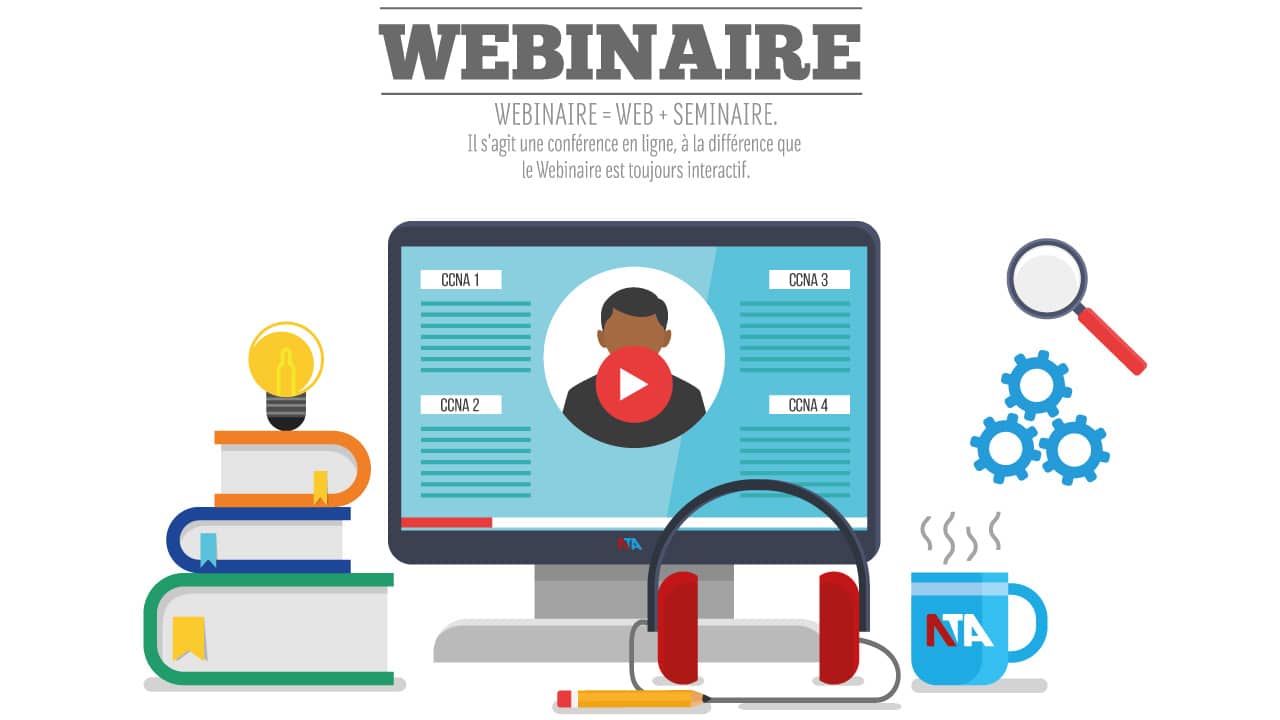Today, new technologies allow companies to communicate in many ways, both internally and externally. Whether via their website, social networks or various online events, companies can easily showcase their expertise and knowledge, promote their products and/or services, or train their employees, even if they are scattered around the world.
For many years, webinars have been a good tool for conveying information or sharing experiences with a diverse audience. It can also be used to increase the visibility of your company.
Find out what a webinar really is, its advantages and disadvantages for your organisation.
What is a webinar?
The term ‘webinar’ is the fusion of two existing words: ‘web’ and ‘seminar’. A webinar is an interactive online conference that is aimed at a larger or smaller audience. Access can be paid or free, for a general or a targeted audience.
This type of event is organised on the Internet via software or a specialised platform. It usually combines different tools such as video conferencing, slide shows and instant messaging to allow participants to interact and ask questions to the speaker.
A company can hold a webinar for several reasons:
– to launch a new product or present its products/services
– to organise an internal training course,
– to present a new strategy,
– collaborate,
– transmit information or resources,
– generate quality leads,
– network and support each other among remote employees.
What are the benefits of a webinar?
Find out what the benefits of hosting an online conference are for your business.
Save time and money.
One of the major advantages of a webinar is that participants can attend from their office. This means they don’t have to travel. This greatly reduces the expense of logistics and event organisation. You save on travel, accommodation and meal costs, the rental of a room and various equipment, and the possible use of staff such as hostesses to manage the participants.
In addition, because they do not have to travel, your employees are less stressed and tired. They also lose less working time and can quickly return to their tasks after the webinar.
An interactive event
A webinar is intended to be an interactive experience. Participants can easily leave comments or ask questions to the speaker via a chat system. The speaker can also use a survey to ask the audience questions and receive an instant response. This establishes a genuine connection between the speaker and the audience. Because their comments are considered, this increases the participants’ interest and engagement. This interaction makes the event more interesting and less dull.
Content creation
Typically, webinars are recorded and uploaded to YouTube or the company’s website. This makes the content easily searchable and shareable, increasing the visibility of your company and developing its image as an expert in a specific field. In addition, it is often necessary to write articles to promote your webinar. This content will aid in the optimization of your natural referencing, attracting new internet users who can be converted into potential customers.
Comprehensive and accurate statistics
A webinar is usually organised via a tool that allows you to collect a large number of statistics. You can see exactly how many people attended, how long they spent on your webinar, where they came from, how engaged they were, and so on. This information is essential to know your strengths and weaknesses, to improve your future webinars and to learn more about your prospects.
What about the downside?
Also consider the downsides of webinars before you start.
The lack of human contact
The main disadvantage of new technologies is the lack of human contact. It is not always easy for the speaker to address a virtual audience that they do not necessarily see. How can you be sure to capture their attention? To encourage participation? This lack of friendliness may discourage some people from participating in a webinar.
Lack of attention
During a remote event, Internet users are usually alone in front of their computer screen. It is therefore easy to be distracted and to lose attention. Rather than concentrating 100% on the online conference, many prefer to continue with their own activities, such as surfing the Internet, reading, and answering e-mails, sorting through their inbox, etc. The audience is therefore not always very attentive and engaged.
Good preparation
To avoid the risk of participants dropping out or the stress of giving a lecture in front of a virtual audience, it is essential to prepare your webinar well. The moderator, presenter and/or speakers should practice beforehand as improvisation can be risky. As with any event, you should also prepare an agenda for participants to see. To reduce stress, you can also anticipate possible questions that may be asked during the webinar.
Beware of technical problems
As with any new technology, technical issues may arise, such as a problem with the Internet connection, a network failure, a problem with the video or sound, participants being unable to connect to the event, and so on. Technical issues can be numerous and diverse. At this type of event, technical issues can be numerous. You must also consider maintenance, data security, live streaming, and webinar recording. All of this comes at a price. As a result, it is critical that the webinar is cost-effective for the company, particularly in terms of productivity and efficiency gains.
For all companies, the webinar is a practical means of communication that has many advantages both internally and externally. However, webinars should be combined with conferences and physical meetings for an optimal strategy.









